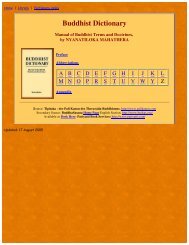The Three Basic Facts of Existence II: Suffering (Dukkha) - Buddhist ...
The Three Basic Facts of Existence II: Suffering (Dukkha) - Buddhist ...
The Three Basic Facts of Existence II: Suffering (Dukkha) - Buddhist ...
- No tags were found...
Create successful ePaper yourself
Turn your PDF publications into a flip-book with our unique Google optimized e-Paper software.
VI. <strong>Dukkha</strong> <strong>of</strong> ChildhoodA FragmentWhen a child is born the first thing it does is to cry. It cries because <strong>of</strong> the violence <strong>of</strong> itsexpulsion from the womb, which is frightening, and the shock <strong>of</strong> cold air upon its bodysimultaneously with the glare <strong>of</strong> light on its unaccustomed and unfocussed eyes. <strong>The</strong> newenvironment irritates its body, and uncertainty, the first shadow <strong>of</strong> fear, has invaded itsconsciousness. It is slapped, and gasps for air, and the first cold intake <strong>of</strong> its lungs is painful. Itscry becomes a howl. It has made its first contact with a hard, unaccommodating world.Some infants cry even before their entry into separate existence. <strong>The</strong>y whimper and strugglewhile still in the womb. Nobody has been able to explain this satisfactorily except those whohold that the unborn child has lived before.Its next sensation is <strong>of</strong> hunger. Its body cries out for nutriment. When this does not comeimmediately, it feels its helplessness and dependence, a consciousness which remains with itthereafter throughout childhood. It is fed, and for a time feels replete. It sleeps; and if it dreamsit is <strong>of</strong> the womb, the only other life it knows. In its sleep it feels an inner disturbance; thedigested food irritates its bowels, demanding expulsion. Messages <strong>of</strong> pain, signals <strong>of</strong> distress,come from its irritated bladder. <strong>The</strong> necessary mechanism works, and it feels relieved. Butalmost immediately the sensation <strong>of</strong> hunger reasserts itself, and the cycle starts over again.<strong>The</strong> infant begins to be aware <strong>of</strong> its surroundings. Its mother is the source <strong>of</strong> food, butsometimes she slaps it, and its attitude towards her begins to be ambivalent. Among its othersensations it starts to include the remoter objects <strong>of</strong> the external world. Some <strong>of</strong> these please it,and it reaches out to grasp them. If it succeeds, it places them in its mouth, because all its desiresare centred there at present. But more <strong>of</strong>ten the object is withdrawn from it, and the child criesfrom frustration. Some contacts are unpleasant; the napkin chafes its skin, loud noises alarm it.Living between desire and gratification it begins to separate the objects <strong>of</strong> its consciousness intothe pleasant, or what is desired, and the unpleasant, that which is repugnant. Both are a source<strong>of</strong> dukkha: the pleasant when it is unobtainable, or when it has been enjoyed to excess, and theunpleasant because <strong>of</strong> its inherent unpleasantness. Some objects are both pleasant andunpleasant, or partake <strong>of</strong> those characters alternately, and towards these the child’s attituderemains unresolved. <strong>The</strong>y are ambiguous objects, and thus sources <strong>of</strong> fear, because the infantcan never feel certain about them, i.e., in what manner they are going to affect it. It forms its firstvalue judgments entirely upon this subjective standard <strong>of</strong> discrimination, and when responsesare not immediate and spontaneous the infant experiences mental disturbance in deciding towhich category <strong>of</strong> experience they belong. Its cries and kicks are the only means it has <strong>of</strong>expressing disapproval <strong>of</strong> its environment. When its mother is present it enjoys a sense <strong>of</strong>security, because she provides warmth, food and soothing contacts. But all these are negativesources <strong>of</strong> happiness; they mean only the temporary removal <strong>of</strong> what is unpleasant and feared.When the mother is absent a sense <strong>of</strong> desolation and <strong>of</strong> being abandoned comes over the infant.Its feeling <strong>of</strong> helplessness and dependence becomes intensified the more it becomes capable <strong>of</strong>understanding its situation with respect to others. Sometimes it is scolded, and does not knowwhy. <strong>The</strong>n its misery becomes acute.<strong>The</strong> child grows stronger and begins to move about on its own. When it sees a desirableobject it crawls towards it and tries to clutch it. Its desires start to take more concrete form, towiden their range and to agitate its mind with more varied and complex responses. Its eyes22
















